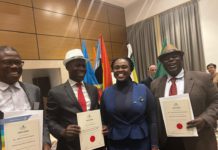
American scientists have confirmed earlier assumptions that the coronavirus does not survive long in high temperatures and humidity.
The assumption has long been spoken of but without any evidence but latest experiments in the lab have confirmed this.
Yahoo News reports that preliminary results from United States (US) government’s lab experiments showed the coronavirus is quickly destroyed by sunlight.
A briefing on the preliminary results, according to Yahoo News reporting, was marked for official use only.
READ:
Nigerian actor reveals why he admires Shatta Wale [watch]
134 arrested in dawn raid for brutalising female police officer in Tamale
The briefing reads “Sunlight destroys the virus quickly,” and now offers hope that the pandemic could ease during high humidity period.
The results are contained in a briefing by the DHS science and technology directorate, which describes experiments conducted by the National Biodefense Analysis and Countermeasures Center, a lab created after the 9/11 terrorist attacks to address biological threats.
But experts say the high temperatures or humidity will by no means eliminate the virus or even necessarily decrease its impact.
The US Department of Homeland Security is, however, cautioning that enclosed areas with low humidity, such as airplane cabins, “may require additional care to minimise risk of transmission.”
The department in a statement, according to Yahoo News, said no conclusions should be drawn based on unpublished data.
ALSO:
Coronavirus vaccine will take ‘many months’ and ‘there are no guarantees’ one can be found
“The department is dedicated to the fight against COVID-19, and the health and safety of the American people is its top priority. As policy, the department does not comment on allegedly leaked documents,” the DHS said in a statement.
“It would be irresponsible to speculate, draw conclusions, or to inadvertently try to influence the public based upon a document that has not yet been peer-reviewed or subjected to the rigorous scientific validation approach,” it said.
The latest lab results, however, give some hope on how the battle against the pandemic could be won.






